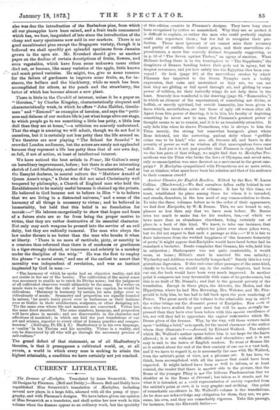CURRENT LITERATURE.
The Dramas of .....Eschylus. Translated by Anna Swanwick. With 33 Designs by Flaxman. (Bell and Daldy.)—Messrs. Bell and Daldy have republished Miss Swanwick's translation of /Eschylus, including several new plays, in a large folio, adorned with all the pomp of typo- graphy, and with Flaxman's designs. We have before given our opinion of Miss Swanwick as a translator, and shall notice her new work in this volume when the dramas appear as an ordinary work, but the specialty of this edition consists in Flaxman's designs. They have long since been recognised by critics as unmatched. Why they are so perfect it is difficult to explain, or rather the man who could perfectly explain could also reproduce them ; but few fail to recognise their per- fection. Those most ignorant of art cannot miss their accuracy and purity of outline, their classic grace, and their marvellous ex- pressiveness, a mere line scarcely distinct frequently suggesting, as in p. 16 of" The Seven against Thebes," an agony of emotion. What Hellenic feeling there is in the frontispiece to The Suppliants," the daughters of Danaos bending before their gods not in agony, but in deepest reverence, and yet how subtly has the Egyptian idea been con- veyed! Or look (page 28) at the marvellous strokes by which Fla.xman has iMparted to the Ocean Nymphs such a bodily expression, that calm and unstrained as they are, we can BOO that they are gliding at full speed through air, and gliding by some power of volition, for their butterfly wings do not help them in the least. Scarcely less wonderful is the drawing (page 83, "Eumenides,") in which an element of the supernatural, of something not divine, or hellish, or merely spiritual, but outside humanity, has been given to faces which, nevertheless, are but those of ugly old women after all. Apart from this power of drawing, it is in this, his faculty of depicting something he never saw in man, that Flaxman's greatest power of thought seems to us to consist, and it is to us irresistibly attractive. It only fails him when he draws Prometheus, who is always to him the Titan merely, the strong but somewhat bourgeois giant whom Zeus defeated, not the sorrowing, patient deity whose "godlike crime was to be kind," who sees .all, foresees all, and bears in the serenity of power as well as wisdom all that unscrupulous force cans inflict. And yet is it not just possible that Flaxman is right, that had we the lost parts of that trilogy, we might find that to /Eschylus Pro- metheus was the Titan who broke the laws of Olympus, and saved, man, only as emancipation was once decreed as a movement in the great cam- paign? If /Eschylus sympathised with Prometheus not as mere artist, but as thinker, what must have been his relation and that of his audience to their common creed?


































 Previous page
Previous page